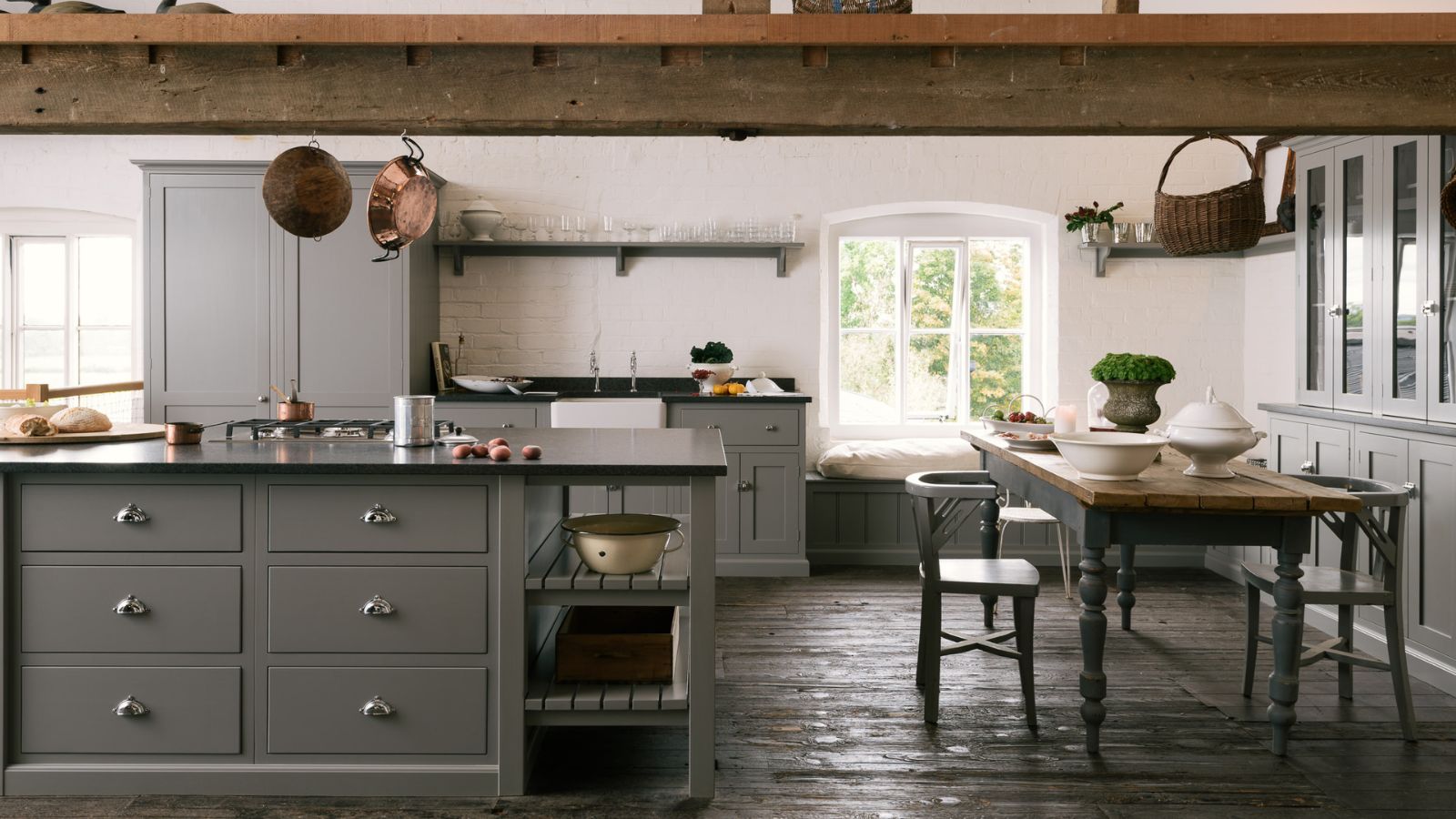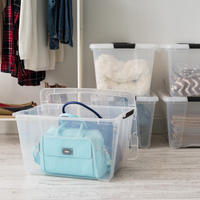How to overcome decision fatigue – decluttering tricks to make everyday life less exhausting
Psychologists have weighed in on the impact of decluttering on preventing decision fatigue


If something as simple as picking out what to wear in the morning is exhausting, then you may be suffering from decision fatigue. But what is it, and how do you overcome it?
Decision fatigue is a form of mental tiredness that results from having to make too many decisions in a short space of time. It can result from something as serious as work, or as menial as picking what to wear each day from a full-to-bursting closet. The result is low mood, stress, and even physical exhaustion.
Luckily, decluttering your home can be a great first step to reducing decision fatigue in daily life – so long as you declutter correctly, that is. Here, professional home organizers and psychologists have explained how to overcome decision fatigue by decluttering your home, and how to avoid it when clearing things out.
How to overcome decision fatigue
Overcoming decision fatigue can be as simple as resting and focusing on self-care for a few days, but more often than not we need to alter our routines to help prevent it from recurring in the future. The best way to do this is to declutter our spaces, says Alex Anderson-Kahl, certified school psychologist at Healing Little Hearts.
‘Every space cleared is a step away from mental clutter and a stride towards focused decision-making,’ he explains.
‘There are so many lesser-known benefits to organizing your home, from reducing the number of choices you have to make for faster, more streamlined routines and decision making, to reducing distractions to allow you to be more productive without the added mental strain.’

Alex Anderson-Kahl is a nationally certified school psychologist with a passion that extends beyond traditional educational psychology. He has a deep-seated commitment to enhancing the emotional, psychological, and educational well-being of children, especially those facing unique challenges.

Decluttering your phone can help to ‘free up mental energy for more important decisions,’ adds Ashima Sahore, a consultant psychologist with Allo Health. ‘It's a practical way to create a more organized and efficient living environment while reducing the cognitive burden of constant decision-making.’
There are plenty of ways to declutter your life to avoid decision fatigue, from going all out with decluttering strategies minimalists swear by, or improving your home storage – reducing clutter by giving every item a defined home. How far you take is up to you – for instance, Steve Jobs, the founder of Apple, was famous for only owning black turtlenecks and blue jeans to avoid having to decide what to wear every day and focus his mind on innovation. We think this is a little extreme, but the effectiveness is undeniable.

Ashima Sahore has a masters in clinical psychology and has been working avidly in the space of therapy and research for the past 2 years. Her expertise lies in areas of stress, depression, anxiety, and improving self-esteem, confidence, and body appreciation among many others.
How to avoid decision fatigue while decluttering

While decluttering your home and working with a minimalist approach can help to prevent decision fatigue in day-to-day life, decluttering itself can be tiring as you ask yourself what to keep, toss, and donate – especially when decluttering sentimental items.
To avoid decluttering overwhelm, the experts recommend following four important steps:
1. Set a time limit
One of the best ways to help avoid decision fatigue while decluttering is to limit how many decisions you are making in quick succession by setting a timer.
Theresa Russell, home organizer, therapist, and founder of Homegirl Space recommends setting a timer for 20 minutes to go through your items and asking yourself whether or not the item adds value to your life, or if it simply makes your everyday life more difficult.
Once the timer is up, stop decluttering – even if you feel energized enough to keep going. The idea is to prevent fatigue, not work until you start to feel exhausted. Have a break and come back to the task feeling refreshed later or on another day.

Theresa Russell is an intentional home organizer with personal and professional experience. She started her intentional home organization business when she moved into a loft with no storage or closets and had to find innovative solutions to make the most out of her space.
2. Pre-categorize items
It is very rare that we recommend home organizing before decluttering, but it can be a great first step if you are feeling overwhelmed, says Ashima Sahore, psychologist.
She recommends ‘sorting your belongings into categories (e.g., clothes, books, kitchenware) first to help you see what you have. This helps you focus on one category at a time, making decisions more manageable and less stressful for your brain by avoiding flicking between categories,’ she explains.
Large Plastic Storage Bin | $79.99 for 4 at Walmart
Large storage containers can be great for corralling your pieces before decluttering so you can easily tidy them away if you need to take a break, helping you declutter without making a mess.
3. Spread your decisions out
Although it is most common to carve a chunk of time out of a day to dedicate to decluttering your home, it is entirely possible to spread your tasks out over weeks, even months, if it helps prevent decision fatigue, says Theresa Russell. This method works particularly well for items you use regularly, such as to declutter a closet:
‘If you are unsure what clothes you wear: when you are hanging clothes back up after washing them, move the hanger in the opposite direction. This will give you a visual for what you wear and what you don't,’ she suggests. ‘If you haven't worn something in six months or more but continually tell yourself you will wear it, it is time to let it go.’
This principle can be applied to other areas of the home too, such as decluttering kitchen cabinets and organizing kitchen appliances. Use your kitchen as normal and after six months evaluate what you haven't touched – you probably don't need to keep hold of them.
4. Tidy intuitively
A leading cause of decision fatigue is trying to think in black and white – either something is important and needs to be kept for practicality, or it needs to go to clear space. One way of tackling this and avoiding declutter regret is to declutter and tidy intuitively, suggests Millie Hurst, Solved section editor for Homes & Gardens.
‘Decluttering using the “spark joy” method is popular for a reason,’ Millie begins. ‘Instead of questioning yourself about an item, interrogating its purpose in your life, look at it and work out what it makes you feel. If it is guilt or irritation, get rid of it. If it's joy or happiness, leave it be.’

Millie Hurst is Section Editor at Homes & Gardens, overseeing the Solved section, which provides readers with practical advice for their homes. Millie has written about and tried out countless cleaning and organizing hacks in the six years since she became a journalist, and has worked in both London and New York.
FAQs
Why does decluttering make me so tired?
Decluttering is a strenuous mental and physical task that can make anyone exhausted – even the pros! It is often caused by a mix of physically moving things around your space and decision fatigue, resulting from making too many choices in quick succession.
This can be helped by creating a sturdy plan before you start decluttering, creating piles ready for things to be stowed away, asking for help to make decisions or move items, and going into the process with a basic idea of what you want to get rid of to make decisions easier down the line.
Why do I always have decision fatigue?
There are a few reasons why you might feel like you always have decision fatigue. Firstly, it may be because you have a job or everyday life that requires you to make a lot of complex or stressful decisions all day, causing a build-up of stress. It may also be caused by having a cluttered or busy home, where you have to think constantly to find objects, decide where they are going to go, or pick out exactly what it is you need. To help alleviate this, it helps to cut back your workload, seek professional help, or for smaller problems, declutter, and find new organizing methods to help reduce decisions at home.
When just starting out with reducing decision fatigue, it can be a good idea to take a leaf out of Steve Jobs’s book. Don’t cut your wardrobe down to five of the same things, of course, but begin with decluttering clothes to a capsule collection of sorts to make the first decision of the day smoother. Then you can take the principal around your home.
Sign up to the Homes & Gardens newsletter
Design expertise in your inbox – from inspiring decorating ideas and beautiful celebrity homes to practical gardening advice and shopping round-ups.

Chiana has been at Homes & Gardens for two years and is our resident 'queen' of non-toxic living. She spends most of her time producing content for the Solved section of the website, helping readers get the most out of their homes through clever decluttering, cleaning, and tidying tips. She was named one of Fixr's top home improvement journalists in 2024.
-
 Barack and Michelle Obama's neutral accent chair is the perfect living room focal point – you can recreate their serene style in any-sized home
Barack and Michelle Obama's neutral accent chair is the perfect living room focal point – you can recreate their serene style in any-sized homeThis designer-approved essential fits into every modern living room – it's beautiful enough to stand alone, while pairing well with your favorite cushion
By Megan Slack Published
-
 Should I choose a kitchen island or a kitchen table? This is the expert advice that helped me decide
Should I choose a kitchen island or a kitchen table? This is the expert advice that helped me decideIt's all about how you use your space
By Molly Malsom Published
